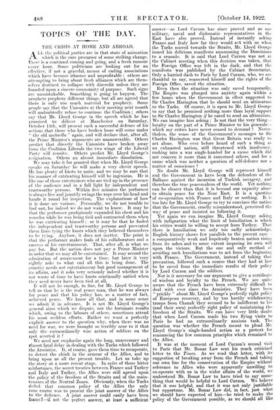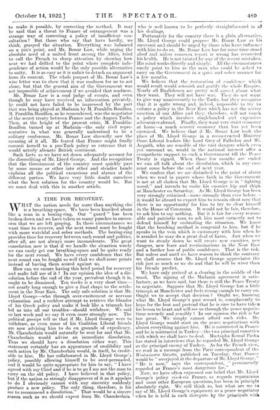TOPICS OF THE DAY.
THE CRISIS AT HOME AND ABROAD. ALL the political parties are in that state of animation which is the sure precursor of some striking change. There is a continual coming and going, and a fresh rumour every hour. Sonic politicians are looking out for an effective, if not a graceful, means of ending associations which have become irksome and unprofitable ; others are attempting to bring about fresh alliances which are them- selves destined to collapse with discredit unless they are founded upon a sincere comm unity. of purpose. Such signs are unmistakable. Something is going to happen. The prophets prophesy different things, but all are agreed that there is only too much material for prophecy. Some people say that the Unionists at their meeting next month will undoubtedly refuse to continue the Coalition ; others say that Mr. Lloyd George in the speech which he has promised to deliver at Manchester on Saturday, October 11th, will present such a successful defence of his actions that those who have broken loose will come under " the old umbrella " again, and will declare that, after all, the Prime Minister's arguments are unanswerable. Others predict that directly the Unionists have broken away from the Coalition Liberals the two wings of the Liberal ]'arty will reunite. Others predict Mr. Lloyd George's resignation. Others an almost immediate dissolution.
We may take it for granted that when Mr. Lloyd George speaks on Saturday he will make a very clever speech. He has plenty of knots to untie, and we may be sure that his manner of extricating himself will be ingenious. He is like one of those entertainers who are tied up in the presence of the audience and in a full light by independent and trustworthy persons. Within five minutes the performer is always free and jauntily swings the rope over his head and hands it round for inspection. The explanations of how it is done arc various. Personally, we do not trouble to find out, for indeed we do not want to know. It may be that the performer prodigiously expanded his chest and his muscles while he was being tied and contracted them when he was extricating himself ; or it may be that he fooled the independent and trustworthy persons and prevented them from tying the knots which they believed themselves to be tying. Anyhow, it does not matter. The point is that the performer makes fools of his collaborators and a success of his entertainment. That, after all, is what we pay for. But the nation does not pay a Prime Minister in order that we may all be entertained. It may accord the admiration of amazement for a time, but later it very rightly asks to what end all this is being done. The country needs not entertainment but good management of its affairs, and it asks very seriously indeed whether it is not waste of time to have knots continually untied when they need never have been tied at all.
It will not be enough, in fine, for Mr. Lloyd George to tell us that he is the real peace man, that he was always for peace and that his policy has, as a matter of fact, achieved peace. We know all that, and in some sense we admit it in advance. It is not Mr. Lloyd George's general aims which we dispute, nor the fortunate results which, owing to the labours of others, sometimes attend his most reckless efforts. Rather we want a perfectly explicit answer to the question why, when there was no need for war, we were brought so terribly near to it that only the extraordinarily wise action of soldiers on the spot averted it ? We need not emphasize again the long, unnecessary and almost fatal delay in dealing with the Turks which followed the Armistice. It, of course, gave them time to recuperate, to detect the chink in the armour of the Allies, and to bring upon us all the present trouble. Let us take up the story at a more recent stage. In spite of those bitter misfortunes, the secret treaties between France and Turkey and Italy and Turkey, the Allies were still agreed upon the policy of the freedom of the Straits and of the main- tenance of the Neutral Zones. Obviously, when the Turks defied that common policy of the Allies the only sane course was to present the joint answer of the Allies to the defiance. A joint answer could easily have been framed—if not the perfect answer, at least a sufficient answer—as Lord Curzon has since proved and as our military, naval and diplomatic representatives in the East have also proved. Instead of instantly asking France and Italy how far they would act with us when the Turks moved towards the Straits, Mr. Lloyd George issued his delirious manifesto summoning the Dominions to a crusade. It is said that Lord Curzon was not at the Cabinet meeting when this decision was taken, that the Foreign Office was left in the dark, and that the manifesto was published by the Cabinet Secretariat. Only a hurried dash to Paris by Lord Curzon, who, we are thankful to say, reasserted himself and the rights of the Foreign Office, saved the situation.
Even then the situation was only saved temporarily. The Empire was plunged into anxiety again within a few hours when the Government in effect suggested to Sir Charles Hariugton that he should send an ultimatum to the Turks. Of course, it is open to Mr. Lloyd George to say that he promised nothing more than loyal support to Sir Charles Harington if he cared to send an ultimatum►. We can imagine him asking : Is not that the very thing— loyalty on the part of a Prime Minister to his generals— which my critics have never ceased to demand ? Never- theless, the sense of the Government's messages to Sir Charles Harington was that Great Britain was ready to act alone. Who ever before heard of such a thing as an exhausted nation, still threatened with insolvency, rushing into a war single-handed for a cause which did not concern it more than it concerned others; and for a cause which was neither a question of self-defence nor a matter of conscience ?
No doubt Mr. Lloyd George will represent himself and the Government to have been the defenders of the Balkans against the incursion of Turkish savagery, and therefore the true peacemakers of the world. Yet nothing can be clearer than that it is beyond our capacity alone to obtain peace for the Near East. It is a question of co-operation with France and Italy or nothing. It is too late for Mr. Lloyd George to try to convince the nation that the Government, cruelly misunderstood, perceived the way of peace and insisted on following it. Yet again we can imagine Mr. Lloyd George asking with indignation what the limit of humiliation is which his critics would be willing to accept from Turkey. That there is humiliation we only too sadly acknowledge. English history shows few parallels to the present case- - a comparatively weak and hopelessly beaten nation rising from its ashes and to some extent imposing its own will upon the victors. But the one and only method of avoiding such humiliations was to act from the beginning with France. The Government, instead of taking that precaution, followed such a course that they had at last to be saved from the immediate results of their policy by Lord Curzon and the soldiers. Nor is it necessary for our argument to give a certificate of wisdom and loyalty to the French. We are quite aware that the French have been extremely difficult to deal with ever since the Armistice. They have been " prickly " about Mr. Lloyd George's perfectly right policy of European recovery, and by too hastily withdrawing troops from Chanak they seemed to be indifferent to his (and their own) perfectly right policy of maintaining the freedom of the Straits. We can have very little doubt that when Lord Curzon made his two flying visits to Paris he had an extraordinarily anxious task. The question was whether the French meant to plead Mr. Lloyd George's single-handed action as a pretext for renouncing the few common principles which remained to the Allies. - - • It was at the moment of Lord Curzon's second visit to Paris that Mr. Bonar Law sent his much criticized letter to the Times. As we read that letter, with its suggestion of breaking away- from the French and taking our own line for the conservation of the Empire without reference to Allies who were apparently unwilling to co-operate with us in the wider affairs of the world, we understand Mr. Bonar Law to have tried to say some- thing that would be helpful to Lord Curzon. We believe that it was helpful, and that it was not only justifiable but opportune. Mr. Bonar Law did, in fact, just what we should have expected of him—he tried to make the policy of the Government possible, as we should all like to make it possible, by correcting the method. It may be said that a threat to France of estrangement was a strange way of correcting a policy of insufficient con- sultation ! But those who say that have hardly, we think, grasped the situation. Everything was balanced on a pin's point, and Mr. Bonar Law, while urging the absolute need of a united front among the Allies, tried to call the French to sharp attention by showing how near we had drifted to the point where complete inde- pendence of action would be the only possible alternative to unity. It is as easy as it is unfair to detach an argument from its context. The whole purport of Mr. Bonar Law's wise letter was to show that it was madness for us to act alone, but that the general aim of the Government was not impossible of achievement if we avoided that madness.
Mr. Bonar Law is a cool judge of events, and even though he may have received no information privately, he could not have failed to be impressed by the part that was being played at Mudania by M. Franklin-Bouillon. M. Franklin-Bouillon, as he remembered, was the negotiator of the secret treaty between France and the Angora Turks. Then, at the height of the present crisis, M. Franklin- Bouillon turned up at Mudania—the only civil repre- sentative in what was generally understood to be a military conference. Mr. Bonar Law shrewdly saw the meaning of it all. He feared that France might finally commit herself to a pro-Turk policy so extreme that it would utterly alienate British sentiment.
Such facts as we have set down adequately account for the discrediting of Mr. Lloyd George. And the recognition that the Government of the country must quickly pass by some means or other into other and steadier hands explains all the political excursions and alarms of the different parties. We have very little doubt ourselves what the best solution for the country would be. But we must deal with this in another article.



































 Previous page
Previous page